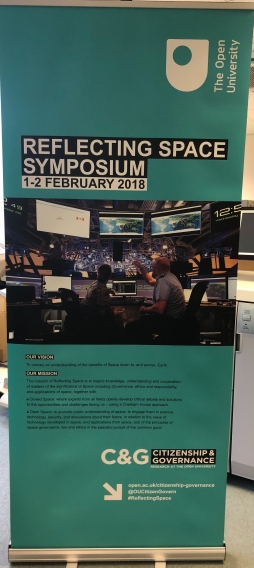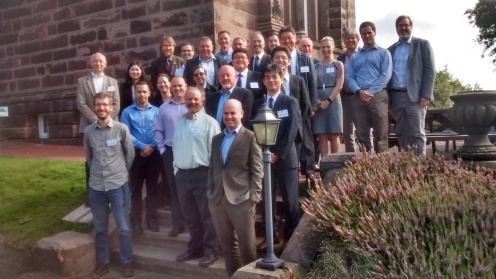 Last week an unusual object was launched from the UK into space, a think tank called Reflecting Space!
Last week an unusual object was launched from the UK into space, a think tank called Reflecting Space!
Its orbit is the policy-making, industrial, defence and educational realms of space.
In particular, the aims of Reflecting Space are to bring together diverse people with diverse expertise to reflect on how to:
Promote the sustainable development of space so that debris does not threaten the benefits of satellite applications,
Explore the applications and opportunities of space science research,
Influence space policy, practise and public understanding, especially by inspiring the next generations through education in the interactions between space and society.
Reflecting Space is the brainchild of Professor Eddie Abbott-Halpin, Ralph ‘Dinz’ Dinsley and Professor Simon Lee. They invited space experts from industry, government and academia to participate in the inaugural symposium, hosted by the Citizenship and Governance Strategic Research Area (SRA) of The Open University (OU).
The symposium, held from 1 – 2 February in the Michael Young Building on the OU campus in Milton Keynes, created an open environment for structured conversation in five sessions: global commons, space governance, international treaties and UK space law, commercial space and space-ports.
Each participant had the opportunity to present their perceptions of the issues and was encouraged to listen and respond to the insights of others.
There were two extra sources of inspiration at the inaugural event. On the first day, the group also visited the nearby Bletchley Park with an excellent guided tour of the code-breaking centre and ‘hands on’ experience of an Enigma Machine. On the second day, two research scientists from the Open University Space SRA shared examples of the OU’s work in space and how that is ‘brought down to earth’ with applications, benefiting people all over the world.

A visit to Bletchley Park provided an stimulating break in the discussions!
The symposium closed with an agreement to make this a regular encounter, with offers to host in different places.
In the short-term Reflecting Space will be hosting a workshop the afternoon before the SMi Military Space Situational Awareness Conference in London (April 2018) as well as participating in the next Space Traffic Management Workshop in Edinburgh (August 2018).
We continue to explore funding options to ensure that, as with space, the think tank is sustainable. We are grateful to all those involved in the setting up of this inaugural symposium, especially Michelle Stevens of the OU, as well as all of the participants.
We welcome interest from all-comers from all countries. Reflecting Space can be contacted via michelle.stevens@open.ac.uk.
Recently I participated in the second annual Space Traffic Management Workshop hosted by the University of Edinburgh, Science and Technology Facilities Council and Lockheed Martin. The workshop brought together invited participants from the academic, commercial and government sectors, including the military, with expertise across a range of domains (not solely space) to discuss the potential future requirements for space traffic management. As noted at the inaugural workshop, more and more satellites are launched each year into orbits populated with an increasing quantity of debris and it has become ever more apparent that there is a requirement to manage space traffic more closely. However, this needs to be achieved without hindering the innovation and inspiration inherent to the space industry. A hindrance many feel is inevitable if/when regulation is applied. Furthermore, space traffic management is a global problem that requires input from a range of disciplines, thus coordination along with collaboration will also be the key to its success but this is inherently more difficult to achieve quickly, and effectively, when large numbers of international participants are involved. Ultimately, I believe we are running out of time as, not only are we approaching the ‘cliff edge’ but the edge is rapidly approaching us.
Last years’ event had considered a number of space traffic management challenges impacting the space operations community including policy, technology and infrastructure issues. This years’ event, held at the Royal Observatory Edinburgh from 29 – 31 August, further explored what the future space traffic management capability may look like, including what and how it would manage ‘traffic’, utilitising a series of scenario based exercises. Its aim ultimately to develop ‘strands’ of research to significantly contribute to the growing dialogue and development surrounding space traffic management.

The view over Edinburgh from the Royal Observatory Edinburgh constantly threatened to distract participants.
This years’ experts were drawn from the UK, USA, Australia, Thailand and Japan with backgrounds spanning government, industry, military and academia. For me, it is the vast differences of experiences amongst the participants which enables the rich discussions that developed around the skeleton framework of the scenarios. Beginning with a brief introductory ‘round robin’ of participants before reviewing the conclusions of last years’ workshop, the participants were quickly ‘launched’ (pardon the pun) into the first scenario developed to answer the question: How would a future Space Traffic Management Centre be informed about an upcoming launch?
The initial discussions centred on the type of information that the ‘Space Traffic Management Centre’ might need to ensure positive tracking and identification; was there a need for a “Space Flight Plan”? A number of themes were explored including the type of information required, how that would be provided to the centre, and how could the information best support monitoring during the launch and deployment phases, particularly for multiple payloads. It was widely agreed that much of this information already exists but currently has to be ‘pulled’ from either the launch providers or satellite operators and there are neither the resource nor means to do so, at this time. Additionally, many owner operators and launch providers are not willing to share too much information on the grounds of commercial and/or national sensitivities; space is inherently ‘proprietary’. However, as was raised on a number of occasions during the event, Air Traffic Control (ATC) manages to get the information it needs to support flight safety so why can’t space traffic management? Will this become easier as space becomes more commercial? Typical of such workshops, the risk of disappearing down a labyrinth of ‘rabbit holes’ was ever present but rarely did the subject stray from supporting the key points of the discussion, and when it did the ‘rabbit hole’ proved purposeful.
The second and third scenarios explored the question of conjunctions and intentional close approaches respectively, and, what space traffic management would need to support ‘safety of flight’ or close proximity operations. Supporting safety of space operations must be a key pillar of any space traffic management system to assure future sustainable space operations. The major conundrum is how this can be provided under current rules and regulations, and if not what regulations are required? This is one of the many divergences when attempting to compare developed ATC to the development space traffic management. Although there are some commonalities current space operations are a long way from the days of developing terrestrial flight; for one space is established after almost 60 years of operation. Owner operators cannot be expected to provide ‘safety of flight’ as they can only guarantee access to data on their own objects and not to data on objects they may be at projected risk of collision from, especially if that object is debris; there is no accurate debris catalogue. Although Space Flight Plans would provide some information informing orbital propagation the current space surveillance data on low earth orbital objects predominantly resides with military systems and therefore we are faced with 2 major problems. Firstly, the military are neither resourced to provide space traffic management nor inclined to provide it; it is not a military responsibility. Secondly, while space surveillance sensors remain under military control it will always prove difficult to share the data/information they generate. This is not such a problem with the proliferation of commercial and academic surveillance sensors covering GEO but will persist until an adequate system of sensors exist for LEO; not only costly but also not a short-term endeavour.
Over the course of the 3 days policy and operational development presentations were also interwoven throughout the scenarios. These included an overview on the developments in the US Federal Aviation Authority potential role in US space traffic management, an update from Secure World Foundation, UN Space Traffic Management activities, NATO space support developments, and finally an impromptu introduction to the fledgling EU Space Surveillance and Tracking Framework.
It is abundantly clear that there is a lot of ongoing work to support ‘safety of flight’, resilient operations and to develop the concept of a ‘space traffic management’ system but we are still a long way from its employment…and that is not including the time it will take to put develop and implement the necessary rules and regulations to support such a system. From the scenario discussions, it became abundantly clear to me that we [national and global space communities] were a long way from even the early stages of a space traffic management system, although some nations were closer to leading than others. The workshop successfully identified a number of key elements to support such a system but the organisations and regulations are far from being prepared to implement the system and promoting responsible space operations has a long way to go before it is viable…even on a national enforcement scale. I got the impression that the appetite to provide data to operators was high but that for regulation and enforcement was low. Even if there were an appetite for regulation the systems currently don’t exist to effectively monitor and enforce.
Personally, I believe that unless someone takes the lead soon we will be too late to assure sustainable space. Although admirable, the idea of the main ‘players’ developing rules of the road for responsible actors to follow will take far too long to develop and implement. The evidence from recent events both in GEO and LEO is that operators, while attempting to act responsibly will still be faced with conflicting responsibilities whether to the customer, market or shareholder. Currently there is no one organisation able to monitor and enforce the any agreed rules and, if there were, where are the proven processes to implement them? Has anyone been taken to task for inappropriate actions in space? With the dawn of mega-constellations looming ever closer, non-traditional commercial companies and disruptive technologies threatening to both reduce the coast of, and increase the number of launches we are rapidly running out of time.
In conclusion this years workshop was extremely productive. A significant number of follow up projects have been identified to keep many of the participants busy over the coming months and a number of research themes were generated and will be circulated within academic circles for consideration. Not only do I look forward to continuing the collaborations over the next 12 months but also to the 2018 Space Traffic Management Workshop. Edinburgh is always a pleasure to visit, but to be able to visit such a great city with exalted company and participate in enlightening discussion…its a no brainer. I hope some of you may be able to join us next year.
Useful links:
1. “The case for a commercial/civil space traffic management capability” – Report from the 2016 Space Traffic Management Workshop. http://events.ph.ed.ac.uk/space-traffic/report
2. 2017 Space Traffic Management Workshop. http://events.ph.ed.ac.uk/space-traffic2
 Participants of the 2017 Space Traffic Management Workshop – Royal Observatory Edinburgh
Participants of the 2017 Space Traffic Management Workshop – Royal Observatory Edinburgh